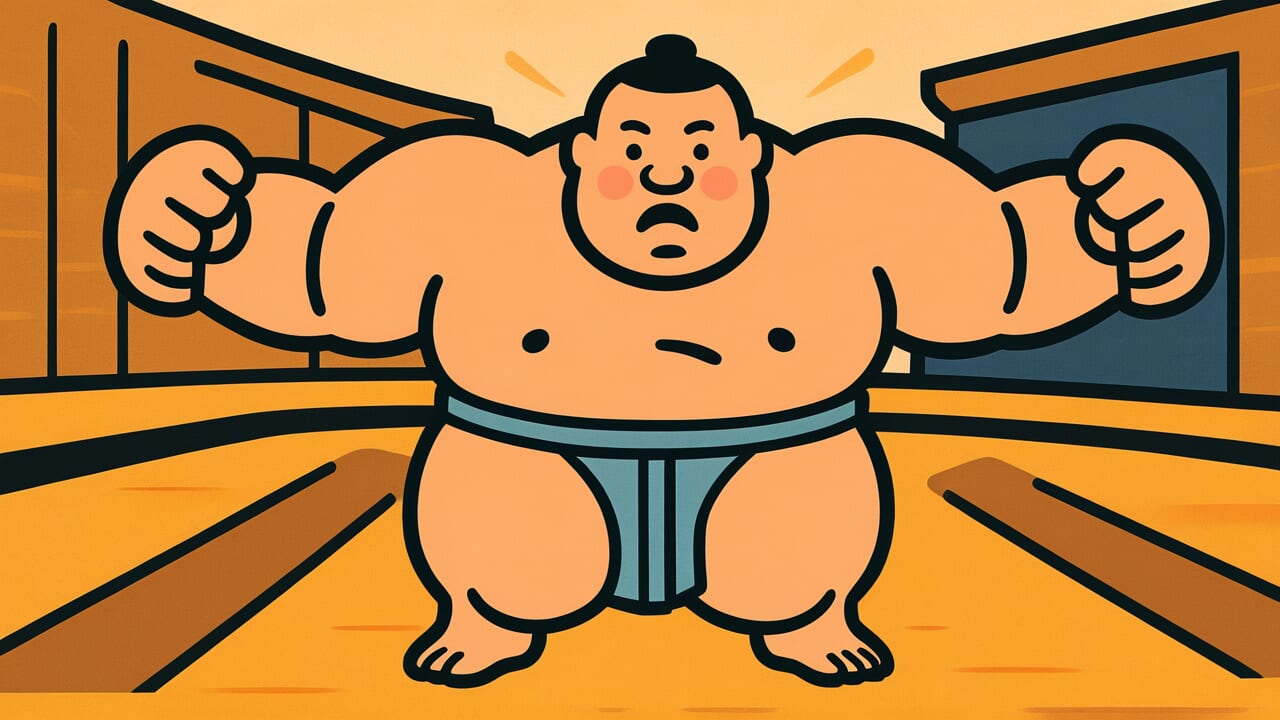How to Read “Win the sumo match but lose the bout”
sumō ni katte shōbu ni makeru
Meaning of “Win the sumo match but lose the bout”
This proverb warns against becoming satisfied with small victories and losing sight of bigger goals.
It describes situations where focusing too much on one immediate success causes you to miss the truly important objective you should have achieved.
This saying applies when you get distracted by partial success and lose sight of your overall strategy.
It also fits when you prioritize short-term gains and damage long-term benefits.
In business, this happens when you focus too much on landing small contracts and lose major clients.
In sports, it occurs when you pour all your energy into one game and your overall season performance suffers.
Today, people understand this expression as teaching the importance of recognizing priority among goals.
It shows the need for wisdom in identifying what the truly important bout is and allocating your strength accordingly.
Origin and Etymology
No clear written records document the origin of this proverb. However, the structure of the phrase offers interesting insights.
Notice how the words “sumo” and “bout” are used differently.
Sumo refers to each individual match. Bout means the bigger goal, like winning the entire tournament or achieving promotion to yokozuna rank.
During the Edo period, sumo was extremely popular entertainment for common people.
Wrestlers needed to win individual matches, of course. But their overall tournament record and rank advancement mattered even more.
If a wrestler put too much effort into one match and got injured or exhausted, it would affect his later matches.
As a result, he might fail to achieve good results for the tournament as a whole.
This reality of the sumo world likely inspired the proverb.
It expresses the human tendency to focus too much on immediate small victories and lose sight of the original big goal.
Through the concrete sport of sumo, it became widely used as wisdom teaching the importance of priorities in life.
Usage Examples
- He became satisfied with success in a small project and missed his chance to change jobs. That’s exactly “win the sumo match but lose the bout.”
- She focused too much on getting a perfect score on this test and got sick, so she couldn’t perform well on the actual entrance exam. This is what “win the sumo match but lose the bout” means.
Universal Wisdom
Humans have a tendency to become captivated by immediate results.
The sense of achievement from one victory is powerful. In that moment, we become convinced we’re walking the right path.
But calmly judging whether that small victory lies on the path to our real goal or is just a side road is actually very difficult.
This proverb has been passed down for so long because it accurately captures this fundamental human weakness.
We tend to value satisfaction we can get immediately over bigger future success. This is a phenomenon psychology calls “present bias.”
We jump at the carrot in front of us and lose sight of the real treasure beyond it.
Thinking more deeply, this proverb also relates to human need for recognition.
Even small victories give us opportunities to be acknowledged by others. The comfort of that recognition can cloud our judgment.
Achieving real goals takes time. During that process, there are lonely periods when nobody evaluates you.
But immediate small successes bring quick praise and recognition. Resisting this temptation requires strong will and clear vision.
When AI Hears This
Putting full effort into the battle before you seems rational. So why does it lead to ultimate failure?
Game theory analysis reveals a surprising structure.
Nash equilibrium refers to a state where each player maximizes only their own benefit, resulting in nobody being able to change strategy.
For example, in price competition between companies, both continue cutting prices until neither makes profit.
At this point, individual decisions are correct but the overall result is the worst possible. This represents divergence from Pareto optimality, a state where everyone could be happier.
Interestingly, higher intelligence makes falling into this trap more likely.
Multi-stage game research shows that people with greater ability to think ahead choose strategies that accumulate immediate victories.
This happens because they think “if I lose, there’s no next time” at each stage, fixating on local victories.
In reality, conceding in certain battles could lower the opponent’s guard and create advantages in the final stage. But this option becomes invisible.
Repeated prisoner’s dilemma experiments prove this too.
Betrayal strategy is optimal for a single round but inferior to cooperation strategy long-term.
Winning the sumo match before you and winning the real bout mathematically have different optimal solutions.
Lessons for Today
Modern society offers environments where social media “likes” and small achievements receive instant evaluation.
This proverb teaches us something especially important precisely because of these times.
First, clarify what goals truly matter to you. It might be promotion, mastering a skill, or time with family.
Keeping that big goal always in your heart makes you less susceptible to small temptations before you.
Next, develop a habit of regularly reflecting on whether what you’re working on actually connects to your real goal.
In busy daily life, you sometimes drift from your original path without noticing. Making time to review your actions even once a month matters.
And while celebrating small successes is wonderful, don’t stop walking after becoming satisfied.
Use each victory as a stepping stone to the next level and transform it into power to move forward.
To win the big bout that is your life, how should you fight today’s small sumo matches?
Holding that perspective is the first step toward a fulfilling life.



Comments